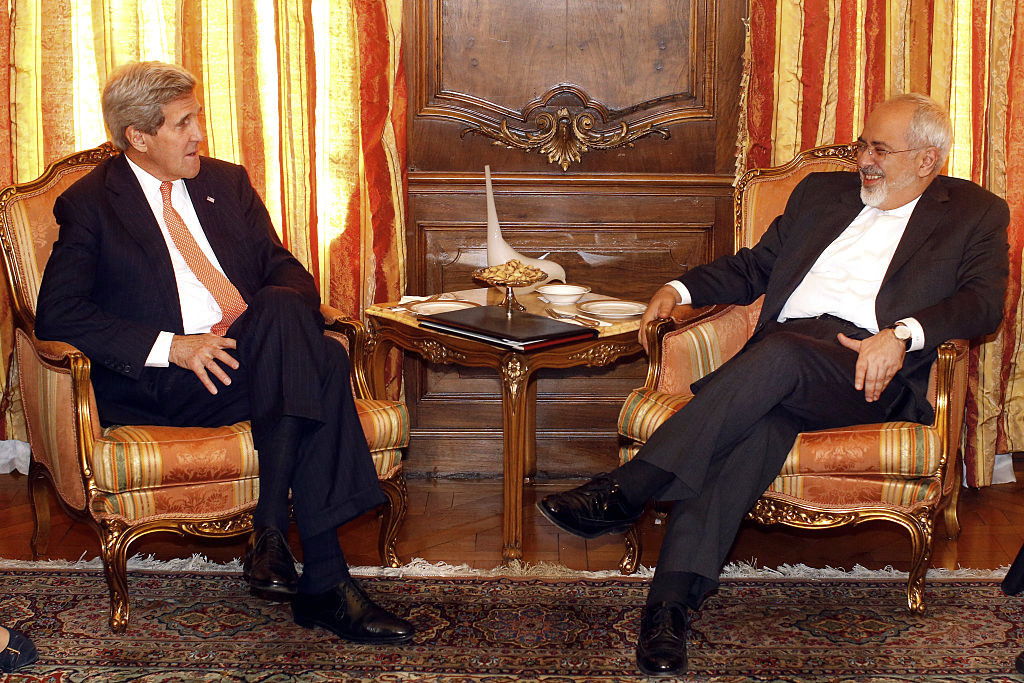 Irański Najwyższy Przywódca Ali Chamenei uważa, że skoro on i Ruhollah Chomeini potrafili grać na siedmiu prezydentach USA jak na skrzypcach, nie ma powodu, dla którego nie miałoby to zadziałać z ósmym. Na zdjęciu: ówczesny minister spraw zagranicznych Iranu Mohammad Dżavad Zarif śmieje się podczas spotkania z ówczesnym sekretarzem stanu USA Johnem Kerrym w siedzibie Organizacji Narodów Zjednoczonych 27 kwietnia 2015 r. w Nowym Jorku. (Zdjęcie: Jason DeCrow-Pool/Getty Images)
Irański Najwyższy Przywódca Ali Chamenei uważa, że skoro on i Ruhollah Chomeini potrafili grać na siedmiu prezydentach USA jak na skrzypcach, nie ma powodu, dla którego nie miałoby to zadziałać z ósmym. Na zdjęciu: ówczesny minister spraw zagranicznych Iranu Mohammad Dżavad Zarif śmieje się podczas spotkania z ówczesnym sekretarzem stanu USA Johnem Kerrym w siedzibie Organizacji Narodów Zjednoczonych 27 kwietnia 2015 r. w Nowym Jorku. (Zdjęcie: Jason DeCrow-Pool/Getty Images)

Trump i pułapka Najwyższego Przywódcy
Amir Taheri
Tłumaczenie: Małgorzata Koraszewska
Po trzyletniej przerwie serial, którego emisję rozpoczęto prawie 50 lat temu, powróci na ekrany światowe w nowym sezonie: Wujek Sam zaleca się do mułłów z Teheranu.
Nowy sezon rozpoczął się od listu wysłanego trzy tygodnie temu przez prezydenta USA Donalda J. Trumpa do Najwyższego Przywódcy Alego Chameneiego, w którym podobno zaprosił go na osobiste spotkanie.
Podobny list wysłał prezydent USA Jimmy Carter w 1978 roku do Ruhollaha Chomeiniego, który przebywał wówczas na wygnaniu na przedmieściach Paryża; dostarczył go były prokurator generalny USA Ramsey Clark.
Carter napisał do Chomeiniego kolejny list rok później, gdy ten przejął już władzę w Teheranie. Doręczony przez doradcę ds. bezpieczeństwa narodowego Cartera Zbigniewa Brzezińskiego na spotkaniu z premierem irańskiego rządu Mehdim Bazarganem, prezydent powtórzył w swoim liście amerykańskie pragnienie przyjaznej współpracy z nowym reżimem w Iranie.
Carter opuścił Biały Dom nie otrzymawszy pisemnej odpowiedzi na swój list. Zamiast tego Chomeini zezwolił na napad “studentów” na ambasadę USA w Teheranie i przetrzymywanie jej dyplomatów jako zakładników.
Mimo to następca Cartera, prezydent Ronald Reagan, wypróbował swój talent epistolarny, pisząc pięciostronicowy list do Chomeiniego, któremu towarzyszył wielki tort, pięknie oprawiona w marokański papier Biblia i półautomatyczny pistolet Colt-45. Chomeini odpowiedział rozkazem wzięcia większej liczby amerykańskich zakładników, finansując atak na koszary piechoty morskiej USA w Bejrucie w 1983 r., w którym zginęło 241 amerykańskich żołnierzy.
Mimo tego wszystkiego następca Reagana, prezydent George H.W. Bush, nie mógł oprzeć się pokusie napisania listu i napisał własne zaproszenie do mułłów z Teheranu na rozmowy, opierając się na mantrze “dobra wola rodzi dobrą wolę”
Prezydent Bill Clinton postanowił uwieść mułłów, którzy zastąpili Chomeiniego, “przepraszając” ich za bliżej nieokreślone przewinienia USA i schlebiając im jako “postępowcom”.
W odpowiedzi Teheran nasilił kampanię “eksportu rewolucji”, bombardując różne miejsca na Bliskim Wschodzie, gdzie stacjonowały wojska amerykańskie.
Prezydent George W. Bush (junior) usunął dwóch największych wrogów teherańskich mułłów w Iraku i Afganistanie, obalając Saddama Husajna i mułłę Omara.
Odpowiedzią Teheranu była dalsza kampania ataków na wojska amerykańskie w Iraku i Afganistanie, połączona z tworzeniem i rozmieszczaniem najemników w Libanie, Syrii, Iraku oraz wśród Palestyńczyków w regionie i poza nim.
Prezydent Barack Obama spróbował innej taktyki: zamiast wysyłać mułłom liściki miłosne, postanowił obsypać ich prezentami, (m.in. gotówką przemycaną przez Cypr), i potraktować Iran jako mocarstwo, którego nie obowiązuje Karta Narodów Zjednoczonych.
Ale to również nie zadziałało.
Pierwsza prezydentura Trumpa zatrzymała plan Obamy, ale ożywiła tradycję listów ustanowioną przez Cartera. Trump przekonał japońskiego premiera Shinzo Abego, aby udał się do Teheranu i dostarczył list Chameneiemu, który odmówił przyjęcia listu i odesłał japońskiego premiera po obraźliwej tyradzie. Trump odpowiedział, wydając listę 12 żądań, które Teheran musiał spełnić lub stawić czoła “maksymalnej presji”.
Chamenei zignorował całą sprawę i oświadczył swoim poddanym, że nie wolno rozmawiać z Amerykanami.
Ulotna prezydentura Bidena podążała tą samą drogą co Obama, rozpieszczała Teheran, a jednocześnie powtarzała niekończące się amerykańskie żądania “negocjacji”.
Teraz, w swojej drugiej kadencji, Trump wrócił do pisania lisów. Tym razem Chamenei przyjął list i nawet napisał odpowiedź, zaledwie dwa tygodnie po stwierdzeniu, że rozmowa z Trumpem byłaby “hańbiąca”.
To również może prowadzić donikąd, ale coś wielkiego już się wydarzyło. Po raz pierwszy, w czwartej dekadzie swoich rządów w Iranie, Chamenei przyjął odpowiedzialność za ważną decyzję zamiast sprawować władzę bez odpowiedzialności.
Jednocześnie odesłał piłkę z powrotem do Trumpa, odrzucając rozmowy bezpośrednie i sugerując rozmowy pośrednie. Jeśli Trump zaakceptuje, najwyższy przywódca ogłosi kolejne zwycięstwo. Jeśli Trump je odrzuci, najwyższy przywódca ogłosi, że wykazał się dobrą wolą, ale został odrzucony.
Celem Teheranu jest albo storpedowanie całej sprawy i zrzucenie winy na Trumpa, albo działanie w zwolnionym tempie w nadziei, że wybory parlamentarne w USA przekłują balon Trumpa.
W takim scenariuszu rozmowy o tym, kto ma być mediatorem, mogłyby trwać tygodnie, jeśli nie miesiące. Logicznym rozwiązaniem byłoby wskazanie Szwajcarii, która reprezentuje interesy USA w Iranie, lub Pakistanu, który robi to samo dla Iranu w Waszyngtonie.
W zeszłym tygodniu jednak rosyjski wiceminister spraw zagranicznych Siergiej Riabkow zasugerował, że Moskwa jest zainteresowana odgrywaniem roli mediatora. Teheran zasugerował, że faworyzuje Oman, podczas gdy Waszyngton może uważać, że sułtanat jest zbyt bliski Iranowi.
Jeśli (i kiedy), obie strony zgodzą się na mediatora, potrzebne będą rozmowy na temat tego, na jakim szczeblu negocjacje powinny się odbyć i gdzie odbędzie się spotkanie. Następnie mogą odbyć się rozmowy na temat ustalenia porządku obrad.
Następnym krokiem będzie zajęcie się tzw. “podszyciem”: kwestiami, które łatwo rozwiązać.
W tej chwili nie jest jasne, jakie dokładnie kwestie Trump chce uwzględnić w domniemanym programie swoich proponowanych rozmów. Teheran jednak chce ograniczyć wszelkie rozmowy do kwestii nuklearnej w zamian za zniesienie sankcji. Źródła w Teheranie twierdzą, że Chamenei może zgodzić się na ogłoszenie 18-miesięcznego moratorium na swój projekt nuklearny, pod warunkiem zniesienia sankcji i demontażu mechanizmu błyskawicznego powrotu sankcji, który ma zostać uruchomiony w Radzie Bezpieczeństwa ONZ w październiku.
Podtekstem tego wszystkiego jest przekonanie Chameneiego, że skoro jemu i Chomeiniemu udawało się grać na siedmiu prezydentach USA jak na skrzypcach, nie ma powodu, dla którego nie miałoby to zadziałać z ósmym.
Zawartość publikowanych artykułów i materiałów nie reprezentuje poglądów ani opinii Reunion’68,
ani też webmastera Blogu Reunion’68, chyba ze jest to wyraźnie zaznaczone.
Twoje uwagi, linki, własne artykuły lub wiadomości prześlij na adres:
webmaster@reunion68.com




